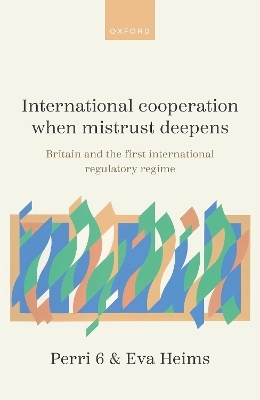
International Cooperation When Mistrust Deepens
Britain and the First International Regulatory Regime
Seiten
2025
Oxford University Press (Verlag)
978-0-19-888242-8 (ISBN)
Oxford University Press (Verlag)
978-0-19-888242-8 (ISBN)
- Noch nicht erschienen (ca. Februar 2025)
- Versandkostenfrei
- Auch auf Rechnung
- Artikel merken
This book draws on neo-Durkheimian institutional theory to explain why states commit to cooperating in multilateral regimes with other states even while their mutual mistrust deepens.
In the years leading up to the outbreak of war in 1914, Britain was closely collaborating with Germany on the development of an improved telegraph service, despite preparations for war also being made by both countries. This cooperation rested upon both states' intensive participation in the global regulatory regime for telecommunications. Why states commit to cooperating in such multilateral regimes with other states while their relationship struggles with deepening mistrust is a longstanding puzzle. As tensions rise among great powers today and international organisations struggle again, this puzzle is as important now as it was when international regulatory regimes first emerged.
The book challenges many of the conventional explanations for this puzzling situation and draws on neo-Durkheimian institutional theory to develop a novel explanation. It examines the case of Britain's relationship with the first global regulatory regime, which was concerned with international telegraphy, submarine telegraph cables, and radiotelegraphy from the 1860s through to 1914. The regime was created in a time of European wars and growing imperial conflicts. Although Britain seriously contemplating leaving the International Telegraph Union in 1901-2, the state went on to deepen cooperation with other countries in telegraphy, including with Germany even as preparations for war advanced.
Drawing on extensive archival sources, Perri 6 and Eva Heims illustrate that social organisation in government can cultivate institutional buffering between aspects of external policy which can sustain commitment despite deepening conflict. In doing so, they show how a neo-Durkheimian approach provides a powerful explanation for deepening cooperation even as mistrust rises and has significant implications for understanding state formation.
In the years leading up to the outbreak of war in 1914, Britain was closely collaborating with Germany on the development of an improved telegraph service, despite preparations for war also being made by both countries. This cooperation rested upon both states' intensive participation in the global regulatory regime for telecommunications. Why states commit to cooperating in such multilateral regimes with other states while their relationship struggles with deepening mistrust is a longstanding puzzle. As tensions rise among great powers today and international organisations struggle again, this puzzle is as important now as it was when international regulatory regimes first emerged.
The book challenges many of the conventional explanations for this puzzling situation and draws on neo-Durkheimian institutional theory to develop a novel explanation. It examines the case of Britain's relationship with the first global regulatory regime, which was concerned with international telegraphy, submarine telegraph cables, and radiotelegraphy from the 1860s through to 1914. The regime was created in a time of European wars and growing imperial conflicts. Although Britain seriously contemplating leaving the International Telegraph Union in 1901-2, the state went on to deepen cooperation with other countries in telegraphy, including with Germany even as preparations for war advanced.
Drawing on extensive archival sources, Perri 6 and Eva Heims illustrate that social organisation in government can cultivate institutional buffering between aspects of external policy which can sustain commitment despite deepening conflict. In doing so, they show how a neo-Durkheimian approach provides a powerful explanation for deepening cooperation even as mistrust rises and has significant implications for understanding state formation.
Perri 6 is Professor Emeritus in Public Management in the School of Business and Management at Queen Mary University of London and Visiting Professor at the London School of Economics and Political Science. His work includes Explaining Political Judgement (2011), and two studies entitled Mary Douglas (2017, 2023), with Paul Richards. Eva Heims is Senior Lecturer in Public Policy in the Department of Politics at the University of York and Research Associate at the London School of Economics and Political Science. She was recently the Principal Investigator on a major study of regulatory capture funded by the Economic and Social Research Council and her work includes Building EU Regulatory Capacity (2019).
| Erscheint lt. Verlag | 6.2.2025 |
|---|---|
| Verlagsort | Oxford |
| Sprache | englisch |
| Maße | 153 x 234 mm |
| Themenwelt | Sozialwissenschaften ► Politik / Verwaltung ► Europäische / Internationale Politik |
| Sozialwissenschaften ► Politik / Verwaltung ► Staat / Verwaltung | |
| ISBN-10 | 0-19-888242-4 / 0198882424 |
| ISBN-13 | 978-0-19-888242-8 / 9780198882428 |
| Zustand | Neuware |
| Haben Sie eine Frage zum Produkt? |
Mehr entdecken
aus dem Bereich
aus dem Bereich
Studienbuch
Buch | Hardcover (2023)
De Gruyter Oldenbourg (Verlag)
CHF 62,90
erfolgreiche Interessenvertretung durch Prozesskompetenz im komplexen …
Buch | Hardcover (2023)
Wiley-VCH (Verlag)
CHF 58,75


